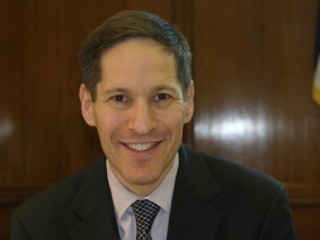
Thomas Frieden biography
Date of birth : 1960-12-07
Date of death : -
Birthplace : New York, New York, USA
Nationality : American
Category : Politics
Last modified : 2010-07-05
Credited as : Director of the U.S. Centers for Disease Control and Prevention CDC, work focused on control of TB , Obama administration
122 votes so far
Dr. Thomas R. Frieden is the Director of the U.S. Centers for Disease Control and Prevention (CDC) and Administrator of the Agency for Toxic Substances and Disease Registry (ATSDR).
He was an "aggressive" New York City Health Commissioner from 2002–2009. Before that, his work focused on control of tuberculosis (TB) in New York City and India.
Thomas R. Frieden became commissioner of New York City's Department of Health and Mental Hygiene in January of 2002. In that role he garnered both hearty praise and sharp criticism for his aggressive battle against chronic disease. Among his controversial initiatives were the city's 2003 tobacco ban and the 2006 proposal to outlaw artificial trans fats.
Early Training and Career
Frieden was born on Manhattan's Upper East Side. His father was the chief of coronary care at Montefiore and New Rochelle Hospitals in New York, and the son followed him into the medical profession. He received an undergraduate degree from Oberlin College and acquired an interest in public health while serving as a community organizer for the Appalachian Student Health Coalition in Tennessee, before attending medical school at Columbia University. During and immediately following his time at Columbia, Frieden further explored public health via medical missions to Nicaragua in conjunction with the Nicaraguan Ministry of Health. He graduated with an M.D. and a master's degree in public health in 1986, and completed his training with a residency in internal medicine at New York's Presbyterian Hospital and a fellowship in infectious diseases at Yale University.
Frieden began working in New York City as an epidemiologic intelligence service officer for the Centers for Disease Control (CDC) in 1990. Two years later he was appointed the city's assistant health commissioner in charge of tuberculosis (TB) control. In that position, Frieden displayed his determination and resourcefulness by leading an aggressive campaign against multidrug-resistant TB, sending health workers into prisons and drug houses to seek infected people, and requiring non-compliant patients to remain in confinement until they were cured. His style offended some, but it was hard to dispute the program's success---by the end of his tenure in 1996, cases of the disease had been reduced by 80%.
Having established himself as an expert on TB, Frieden signed on as a medical officer for the World Health Organization on loan from the CDC, and moved to India in 1996. He and his team were effective in developing a disease control plan that succeeded in expanding India's TB program to include 80 percent (up from just 2 percent) of the population, with a cure rate of 84 percent. Approximately half a million lives were saved.
Man on a Mission
Frieden was lured back to his hometown in January of 2002, with an offer to head up the city's health department, one of oldest and largest such agencies in the world. He reportedly accepted the job only after receiving assurances that he could introduce anti-tobacco initiatives. Carte blanche was given, and in 2003 New York City passed one of the most stringent indoor smoking bans in the world, and the prohibition became one of Frieden's most famous and controversial endeavors. After that, instead of focusing on traditional reactive medicine, such as dealing with the outbreak of infectious diseases, Frieden's department began addressing chronic diseases such as heart disease, cancer, and diabetes, in a preventive fashion. The approach was applauded as revolutionary by some and characterized as intrusive by others.
Whether one admired or despised him, it was clear that Frieden was a man on a mission. From expanded HIV testing programs to cancer screenings to online availability of restaurant inspection results, the health department's programs were designed to improve the public's health as well as change its behavior. Frieden made headlines again in 2006, when he proposed a ban on artificial trans fats in New York's eateries. Protests and uproar were immediate, naturally, but the commissioner stood firm. The proposal was to go before the Board of Health in December of 2006.
AWARDS
American Cancer Society, William G. Cahan Memorial Education Award; Centers for Disease Control, Honor Award in International Health; New York City Department of Health, Award for Excellence; U.S. Department of Health and Human Services, Secretary's Award for Distinguished Service.
















